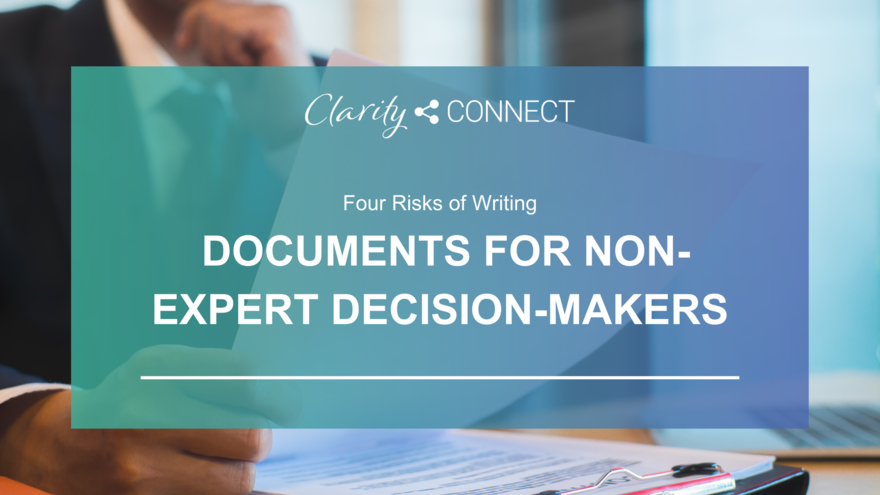
During the height of the COVID-19 pandemic, we witnessed an appalling demonstration of what happens when a non-expert makes a policy decision without understanding or respecting expert opinion. Donald Trump’s arrogance hit a dangerously new high when he stood on the White House Balcony, fresh out of hospital and still infected with COVID-19 and ripped his mask off in front of the press.
In a perfect world, the people holding power would make decisions based on sound advice from well-informed, well-meaning experts. But in the real world, decision-makers often ignore the advice they receive. In some cases, arrogance is to blame. But in other situations, leaders receive great advice in the form of thorough, carefully reasoned documents—yet they somehow don’t hear it.
Let’s give such leaders (Trump aside) the benefit of the doubt. Let’s assume they want to make a sound judgement based on expert knowledge, but something prevents them from understanding and acting on expert input. That “something” could be the writer’s failure to mitigate these four risks of writing for non-experts:
Risk #1: The Non-Expert Won’t be Able to Navigate the Document
Have you ever submitted a report or set of specifications for approval only to wait and wait for a reply that never comes? The problem may not be that the person with approval authority isn’t interested in reading your document. They may not understand how to read it.
To help non-experts navigate complex documents, here are some strategies to try:
- Provide a one-page executive summary, written in layperson language.
- Create an overview section, instructing readers on how to read the document.
- Be generous with heading and subheadings, which make it easy to see the logical structure of ideas and information.
Risk #2: The Non-Expert Won’t be Able to Understand the Advice
Have you heard the story about the leader who signed off on a design document and then rejected the product once it was built, exactly to specification? I have, unfortunately, heard this tale told more than once. No one likes to look foolish, and some leaders would rather approve something they don’t understand than lose face by asking for clarification.
To avoid the risk of this kind of false sign-off, here are some writing moves you can make:
- Choose the simplest word possible.
- Shorten your sentences.
- Make active voice your default setting.
- Clearly define technical terms.
- Use more than one kind of definition, including parenthetical definitions and comparisons.
- Communicate visually—through well-labeled tables, charts, and diagrams.
Risk #3: The Non-Expert Won’t Appreciate the Urgency of the Situation
As an expert, you probably distrust hype and have a disdain for fear mongering and inflammatory language. As a result, you may understate the need to attend to an issue, and you may use neutral or indirect language that sounds non-urgent to a non-expert.
To avoid that trap, state your expert opinion with confidence, and avoid hedging your advice. In the world outside of the lab and the library, cautiousness about overstating results can sound like self-doubt.
Example of hedging: Evidence suggests that wearing a non-surgical mask may, in many situations, help to prevent the spread of COVID-19.
Example minus the hedging: Experts recommend wearing a non-surgical mask to prevent the spread of COVID-19.
Risk #4: The Non-Expert Won’t Know Exactly What to do Next
When you’re writing to someone at the top of the organizational chart, it may feel a bit awkward to tell that person what to do. But documents such as recommendation reports make a difference only if they take an assertive tone. That doesn’t mean ordering the boss around, but it does mean clearly stating the action that you, as the expert, see as the right next step.
To increase your influence with decision-makers, learn the art of diplomatic recommendation. Express your informed suggestions with confidence. Avoid indirect statements, such as “It is recommended that….” Instead, focus on the benefit to be gained and steer the decision-maker directly toward that result.
Indirect recommendation: It might be possible to avoid replacing the whole roof if we were to install new gutters and replace the edge tiles that are currently showing wear.
Benefit-oriented recommendation: To avoid replacing the whole roof and prevent further damage to the building, we should install new gutters and replace the edge tiles that are currently showing wear.
Act Like the Expert Advisor You Are
When you’re asked to give expert advice, act like a genuine advisor. Offer your informed opinion, back it up with evidence, and point the way to a clear solution.
Respect the authority of the leader by giving them options, but make sure you’ve done everything in your power to make sure they understand exactly what those options are and how to implement them. By paying attention to your advising style, you’ll minimize the risks of writing for non-experts and maximize your influence with them.


Comments